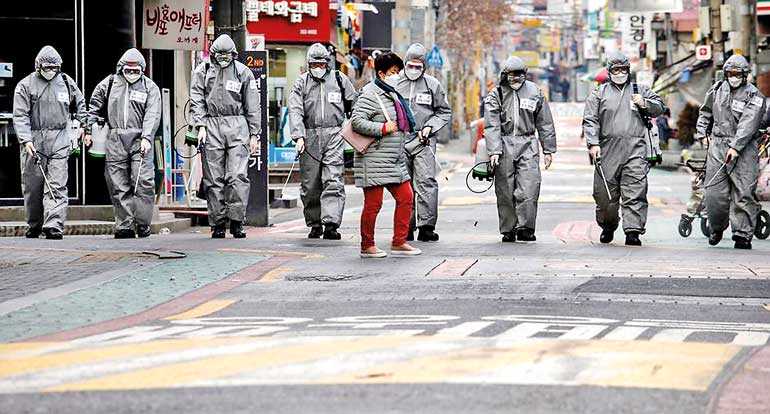Tuesday Feb 24, 2026
Tuesday Feb 24, 2026
Thursday, 5 March 2020 01:32 - - {{hitsCtrl.values.hits}}

South Korean soldiers in protective gear sanitize a shopping street in Seoul, South Korea - REUTERS
SEOUL (Reuters): South Korea reported 516 new coronavirus cases on Wednesday as thousands of sick people waited for hospital beds in Daegu, the city at the centre of the worst outbreak outside mainland China.
The new cases bring South Korea’s total to 5,328, with at least 32 deaths, the Korea Centers for Disease Control and Prevention (KCDC) said. Most cases were in and around Daegu, the country’s fourth largest city, where the flu-like virus has spread rapidly through members of a fringe Christian group.
Health officials expect the number of new cases to be high for the near future as they complete the testing of more than 200,000 members of the Christian sect, as well as thousands of other suspected cases from smaller clusters.
“We need special measures in times of emergency,” South Korean Prime Minister Chung Sye-kyun said during a special cabinet meeting.
“In order to overcome COVID-19 as quickly as possible and minimise the impact on the economy, it is necessary to proactively inject all available resources.”
COVID-19 is the illness caused by the new coronavirus which emerged from central China late last year and has spread around the world.
South Korean President Moon Jae-in has canceled his planned trip to the UAE, Egypt and Turkey in mid-March, due to the alarming spread of the disease at home, according to the presidential Blue House.
Hospitals in South Korea’s hardest hit areas were scrambling to accommodate the surge in new patients.
In Daegu, 2,300 people were waiting to be admitted to hospitals and temporary medical facilities, Vice Health Minister Kim Gang-lip said.
A 100-bed military hospital that had been handling many of the most serious cases was due to have 200 additional beds available by Thursday, he added.
On Tuesday Moon declared “war” on the virus, apologised for shortages of face masks and promised support for virus-hit small businesses in Asia’s fourth-biggest economy.